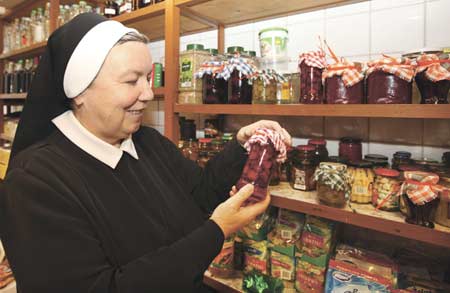 KRAKOW, Poland — Emerging from the quiet of her convent, Sister Anastazja Pustelnik was confronted by a jarring image – her smiling face on posters plastered around town to hawk the cookbooks that have made the 59-year-old nun one of Poland’s best-selling authors.It’s fame Sister Anastazja never bargained for when she left the material world as a young woman, expecting to toil in obscurity for God. But her ability to create easy-to-follow recipes for delectable cakes and traditional home cooking has resulted in five cookbooks since 2001 that have sold a combined 1.1 million copies in this country of 38 million.
KRAKOW, Poland — Emerging from the quiet of her convent, Sister Anastazja Pustelnik was confronted by a jarring image – her smiling face on posters plastered around town to hawk the cookbooks that have made the 59-year-old nun one of Poland’s best-selling authors.It’s fame Sister Anastazja never bargained for when she left the material world as a young woman, expecting to toil in obscurity for God. But her ability to create easy-to-follow recipes for delectable cakes and traditional home cooking has resulted in five cookbooks since 2001 that have sold a combined 1.1 million copies in this country of 38 million.
Today, her cookbooks are found in shops and online, their glossy covers showing Pustelnik with an apron over her black nun’s habit and a mixing bowl or serving platter in hand, generating the unwelcome fame thrust upon her.
Sister Anastazja’s success comes amid a broader trend of men and women of God earning renown and profit in Europe with cookbooks and TV shows. A Spanish television channel, for example, broadcasts “Bocaditos de Cielo” – Little Mouthfuls of Heaven – in which Sisters Liliana and Beatriz of the Franciscan Conceptionist Sisters Convent guide viewers through the culinary steps for making ancient sweet recipes while also offering insight into their cloistered life.
In Poland, a deeply Roman Catholic country with a strong bond to the late Polish pope, John Paul II, the appeal of Sister Anastazja also reflects how the Catholic church is still present in daily life even as economic growth and European Union membership push the country toward secularization.
Priests and nuns are common characters in Polish television serials. And a nun is a much more likely kitchen guide to Polish village housewives than such sultry cooking superstars as Britain’s Nigella Lawson or the American Rachael Ray.
Despite worldly success, Sister Anastazja says all her efforts are in service to God. After morning prayers, she walks every day from her convent to the Jesuit center in downtown Krakow to cook lunch for 20 priests, giving them “strength when they go out into the world.” At Easter she bakes each priest a lamb-shaped cake to take on visits to their families.
One of her cakes, she said, came to her in a dream. The creation, dubbed “A Nun’s Secret,” layers cheesecake, pink fruity gelatin and yellow cake all beneath a shell of chocolate icing.
“It is only God who gives me the recipes. Who else?” Sister Anastazja, a member of the order Daughters of Divine Love, said in an interview with The Associated Press at the Jesuit center.Sister Anastazja had been cooking for the Jesuits for years when they got the idea to put some of her best recipes together in a brochure, said Father Bogdan Calka, a director at the Catholic publishing house WAM. That evolved into her first book, “103 Cakes of Sister Anastazja,” which was published in 2001 and became a surprise success. With 400,000 copies sold to date, it is her most popular book.
Later books include recipes for Polish classics: hearty casseroles, a cabbage-and-sausage stew called bigos, and golabki, or stuffed cabbage rolls. Her latest book, published this year, brings together 123 salad recipes.
The publishers say Sister Anastazja’s books owe their success to recipes that are easy to follow and don’t intimidate new cooks.
Most of her recipes are Polish classics, but a few international favorites are included, such as Greek moussaka, Hungarian lecso and Italian dishes like spaghetti carbonara. She said she began to embrace Italian dishes when some of the Jesuits priests requested them after returning from studies in Rome.
Through the years, Sister Anastazja has included more of her own inventions, recipes that get tweaked and perfected with feedback from the Jesuits.
“Her latest book would have never come out 10 years ago because there wouldn’t have been any way to prepare such unusual salads,” Calka said. The book offers up a ravioli salad with sun-dried tomatoes and other entrees that use capers, bamboo shoots and the leafy green known as rocket or arugula.

